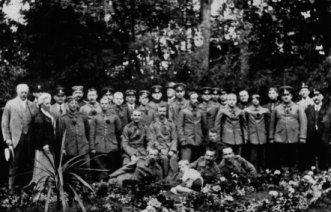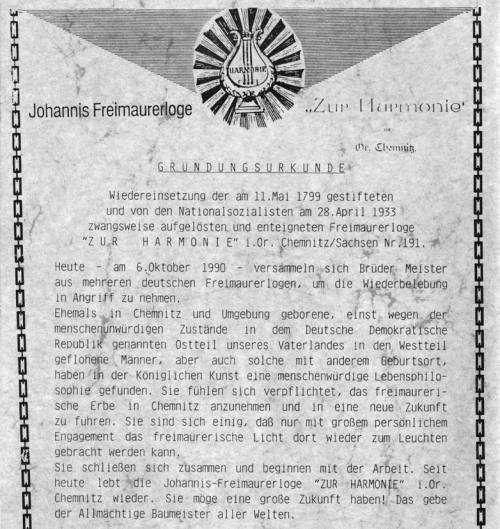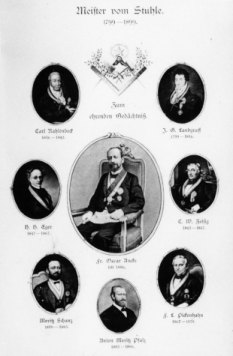- Foundation (1799)
- Members (19th/20th century)
- Social Activities (19th/20th century)
- Politics (19th/20th century)
- Third Reich (1933 -1945)
- German Democratic Republic (1945 -1990)
- Federal Republic of Germany (since 1990)
French Revolution brought unrest and desorientation to Saxony, too. At the same time industrialisation began in Chemnitz and his neighbourhood: between 1798 and 1804 two or the earliest factories (cotton mills) of Germany were founded here.
 In this
period of unrest and break-up several merchants from Chemnitz and Hohenstein
who in England or in Dresden had come into contact with masonic ideals,
decided to found a lodge. In 1799 they got permission of the Grand
Lodge of "Royale York". See of this new lodge "Zur
Harmonie" was the little town Hohenstein, situated 15 km east
of Chemnitz in the small territory of the Prince of Schönburg.
In this
period of unrest and break-up several merchants from Chemnitz and Hohenstein
who in England or in Dresden had come into contact with masonic ideals,
decided to found a lodge. In 1799 they got permission of the Grand
Lodge of "Royale York". See of this new lodge "Zur
Harmonie" was the little town Hohenstein, situated 15 km east
of Chemnitz in the small territory of the Prince of Schönburg.
In 1823 the lodge was transferred to Chemnitz.
The founding members:
- Johann Gottlieb Esche, merchant, Chemnitz
- Friedrich Esche, merchant, Chemnitz
- Großer, merchant, Hohenstein
- Landgraf sen., merchant, Hohenstein
- Landgraf jun., merschant, Hohenstein
- Chr. Gottlieb Roch, rector,
- Zill, merchant, Hohenstein
From 1799 until 1933 more than 1800 masons belonged to the "Harmony". In our exhibition in Chemnitz we show the complete list of members; in the Internet we present a selection.and a list of Chairmen.
The list of members seems like a "Who is Who" of the upper class. Most
of the important factory owners (e.g. Clauss, Hartmann, Zimmermann, Reinecker)
have been members of this lodge as well as many state and town officials,
teachers and musicians.
From the very beginnings the lodge helped without much publicity victims of accidents, widows and orphans. Step by step permanent foundations were established (see complete list of the 14 foundations of the"Harmony").
The most impressing public effort was taken in Wold War I, when the lodge opened her new building to victims. A renowned eye-doctor was member of the loge, so they decided to open an ophthalmic hospital, where people with severe eye injuries were treated free of charge by the doctor and by nurses, i.e. by masons' wifes and daughters specially trained for this new service.
 hospital
hospital
Masons are part of society. It is no wonder, that the members of the "Harmony" in 19th century shared stongly conservative, german-national and monachist convictions. But nevertheless basic masonic ideas of humanity and tolerance proved to be effective, too.
The "Harmony" voted for opening of German lodges to "Israelites" and they accepted as early as 1877 a jewish member - only ten years after the first jewish people were allowed to settle again in Chemnitz.
After the victory over the French army 1870/71 the "Harmony" - quite contrary to prevailing public opinion - urged : " ... not to withdraw love from the defeated enemy" and "to make permanent peace".
In 1918/19 the "Harmony" despite their former convictions declared that
they wold be loyal to the new republic and to democracy.
After 15 years of increasing anti-mason propaganda (especially by general Ludendorff and his wife) the National Socialists closed all lodges in 1933. Some masons tried to cooperate with the new "National Movement", but in 1935 the follow-up masonic organisations were dissolved and all masonic activities forbidden and suppressed.
The beautiful temple of the "Harmony" had a dreadful fate: First it
served as a Nazi-museum of anti-masonic propaganda, then it was
destroyed by bombs.
No lodges were readmitted in the GDR, but nevertheless the position toward masons was quite differenciated.
In contrast to most Eastern European states the GDR has never forbidden
masonry. The scholars of history, philosphy and literature had a positive
view of the historic role of masonry. But this esteem did not influence
the position towards actual masonry. According to socialist doctrine there
was no longer need of masons as progressive elements of bourgeoasy, because
the revolutonary role now was the historical duty of labour class. Masons
of present times seemed a mere revival of out-of-date rituals.

After Union of both Germanys several masons, born in Chemnitz but now living in West-Germany decided to revitalize the lodge "Zur Harmonie" in - as they call it - " the orient Chemnitz". As new lodges have to be founded from existing and approved ones, the initiative had to come from west. But many founding members - including the Chaimen had always lived in Karl-Karx-Stadt / Chemnitz.
Today the new lodge "Harmony" has nearly 50 members. In January 1999 they were able to open a small new temple.
e
x
t
 |
 |
| Logde Buildings | Visit the Museum |
| top
of this page |
Freemason Homepage |
 |
 |
a
c
k
